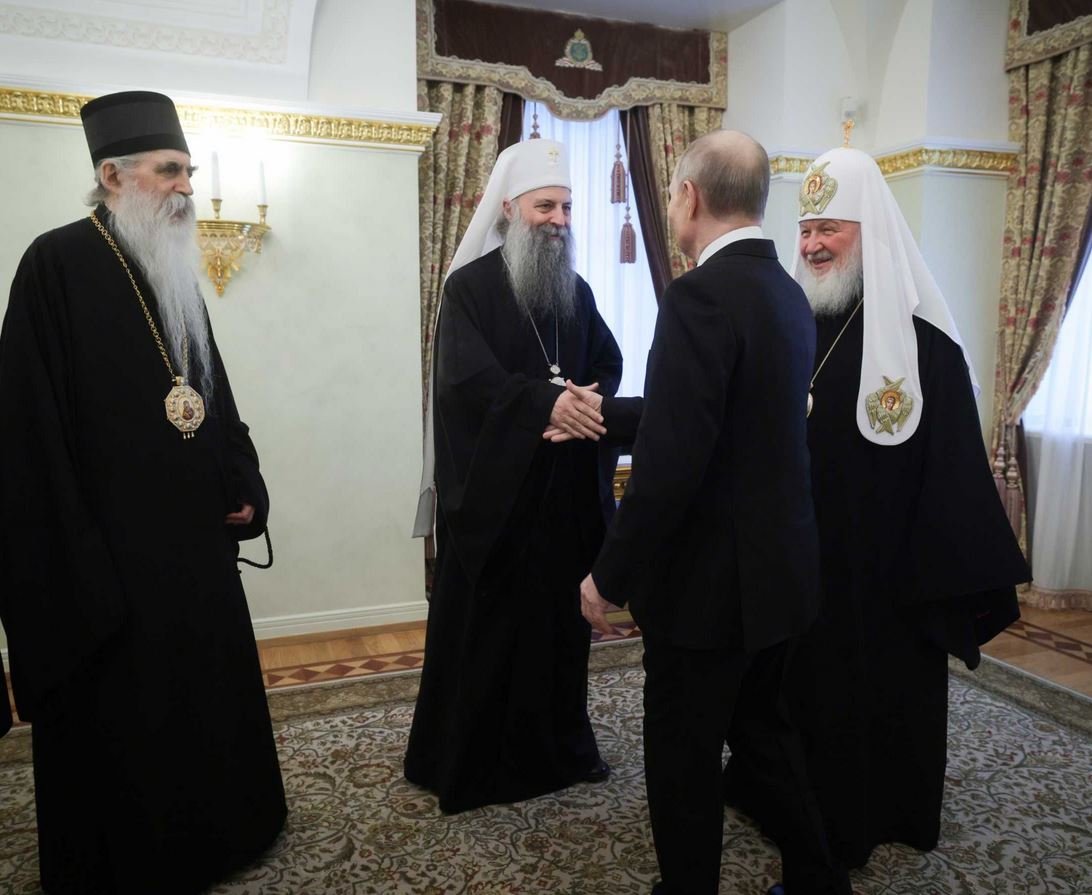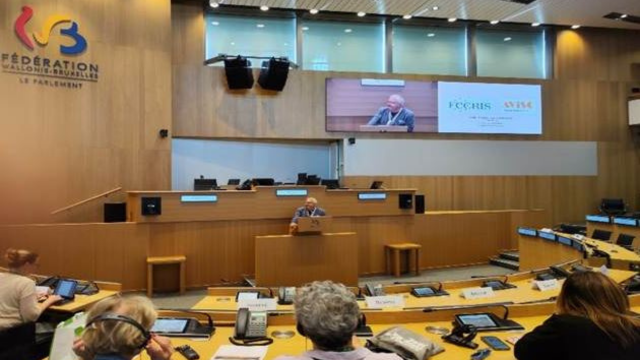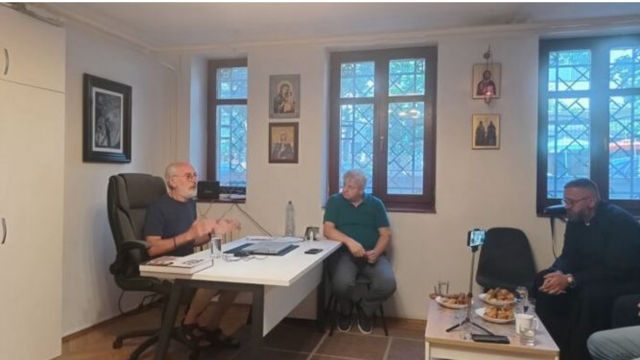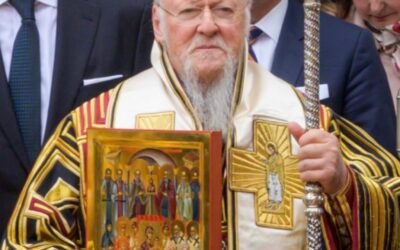The European anti-cult federation might have excluded its Russian branch, but Russian anti-cultists and their Serbian allies, who are still involved, are like two peas in a pod.
by Willy Fautré

On 19 and 20 June 2025, FECRIS, the European Federation of Centres of Research and Information on Cults and Sects, very discreetly held a conference in Brussels in the premises of the Parliament of the “Federation Brussels-Wallonia.” The event was not announced on its website and, therefore, not made public, obviously to avoid the attendance of “undesirable” participants who might have challenged a number of its controversial policies in an open democratic debate.
As of early August, nothing had been published on FECRIS’s website since the event. Strange as it may seem, the Missionary Department of the Archdiocese of Belgrade-Karlovci of the Serbian Orthodox Church recently reported about the event, listing several speakers and summarizing some presentations in a few lines.

Why is the Serbian Orthodox Church so much interested in infiltrating FECRIS?
Among the FECRIS member associations participating in the conference was the Serbian “Center for Anthropological Studies,” which appears at first glance to be a normal academic institution.
Their representatives were Andrej Protić and Slobodan Spasić, also permanent experts associated with the “Apologetics Section of the Missionary Department of the Archdiocese of Belgrade and Karlovci of the Serbian Orthodox Church.” This means that in this capacity, Andrej Protić and Slobodan Spasić are at the service of the Serbian Orthodox Church and are not neutral actors.
Protić is also employed at the Ministry of the Interior of the Republic of Serbia as an analyst and, afterwards, as a security officer and inspector in criminal matters in the high-tech crime unit. He is currently a major in the Serbian police. Slobodan Spasic is a psychologist and specialist in military psychology.
In 2020, he published an article titled “Unfreezing the Kosovo problem could lead to the loss of all of Serbia!” in which he vividly accused the Western powers of dismembering the historical state of Serbia and of attempting to obtain a regime change.
The anti-Western and pro-Russia Serbian Orthodox Church, which supports Putin’s war on Ukraine, as well as anti-Western political forces in Serbia, now have a seat, an eye, and an ear in FECRIS.
Again, FECRIS has failed to keep extremist powers far from its bed. Its divorce at the forceps from its Russian member associations in 2023 does not seem to have served as a lesson, as its Serbian Orthodox partner fully takes sides with President Putin and his war, the Patriarch of the Russian Orthodox Church, and “their values.”
The Serbian Orthodox Church is proud to support Patriarch Kirill and Putin’s ideology
In mid-March 2024, an important religious and political delegation from Serbia attended the funeral service and burial in Moscow of the representative of the Patriarch of Serbia under the Patriarch of Moscow and All Rus. On the side of this event, both patriarchs met and publicly reaffirmed their unity.
In November 2024, during the visit of Russian Metropolitan Anthony of Volokolamsk to Novi Sad, in Serbia, the Russian Orthodox Church conveyed its “gratitude to the Serbian Orthodox Church for its unwavering support to the Ukrainian Orthodox Church (UOC),” which is allegedly persecuted by the Ukrainian state because of its communion with Patriarch Kirill.
In late April 2025, Patriarch Porfirije of the Serbian Orthodox Church was on an official trip to Russia. Both Patriarchs then publicly reaffirmed their unity against the West, including in the “Holy War” against Ukraine and the West as it was defined by the Russian Orthodox Church.

On that occasion, the Primate of the Russian Orthodox Church warmly congratulated Serbian Patriarch Porfirije on being awarded the Moscow Theological Academy’s honorary doctorate. During the discussion, it was also noted that previous honorary doctorates from Russian Orthodox theological institutions had been granted to some predecessors of Patriarch Porfirije: Serbian Patriarchs Gavrilo (†1950) and German (†1991).
On 23 April, Porfirije sat down for dinner with Russian Patriarch Kirill and President Vladimir Putin. Throughout the conversation, Putin continuously emphasized that the Kremlin and the Russian Orthodox Church were defending traditional Christianity and Christian values, explicitly saying that “things that are happening to human morality in the West today… [are] the work of the devil.”
About this official visit, the Heinrich Böll Foundation then published an article titled “The wrong pilgrimage at the wrong time,” in which the author, Balša Božović, stressed that the event in Moscow highlighted an increased alignment with Russia and raised serious concerns about Serbia’s relationship with the European Union. This religious step was followed by another controversial political step on 9 May: the participation of President of Serbia Aleksandar Vučić in the celebration of the end of WWII in Moscow. These initiatives have increasingly strained the already difficult relations between the EU and Serbia, a point underscored in the recently adopted European Parliament report on Serbia’s progress towards EU membership, highlighting insufficient progress on the rule of law and human rights.
In this continental game of diplomatic chess, the Missionary Department of the Archdiocese of Belgrade and Karlovci of the Serbian Orthodox Church’s role is obviously to hook FECRIS through its Serbian member association and make it an ally on several issues in the future.
Last but not least, Alexander Dvorkin, former vice-president of FECRIS, visited the Missionary Department of the Archdiocese of Belgrade–Karlovci in Serbia on 1 August 2025 and held a lecture titled “The phenomenon, process, and reasons for entering a cult.” He was praised for highlighting “the current cultic and manipulative activities in both Russia and Serbia.”
While France is the paragon of the separation of church and state, it finances FECRIS, which shares its bed with an association linked to a political regime rooted in the non-separation of church and state and instrumentalizing this relationship with a foreign state hostile to the European Union, the Federation of Russia.
The former dangerous liaisons of FECRIS with the regime of President Putin
After critics published many facts and evidence, FECRIS felt compelled to put a message on its website’s homepage affirming that it had separated itself from its Russian member associations, rooted in the Russian Orthodox Church, whose Patriarch Kirill has supported Putin’s war from the beginning.

It is only one year after the beginning of the war that FECRIS finally resorted to excluding its Russian branch and its representative, Alexander Dvorkin, who is known for his hostility to and his hate speech against minority religions, mainly of foreign origin, but not only.
Dvorkin had for a long time been a valuable ally of FECRIS in its fight against what they called harmful, destructive, totalitarian… so-called “cults.”
From words to facts: Alexander Dvorkin, vice-president of FECRIS for 12 years
FECRIS, which was created in Paris in 1994 and is significantly funded by the secular French Republic, has been identified by the U.S. Commission on International Religious Freedom (USCIRF) as a primary international threat to religious liberty in Europe.
Alexander Dvorkin, an employee of the Russian Orthodox Church, who received political appointments from Putin’s regime, became a prominent and very vocal representative of the Russian member associations in FECRIS. In 2009, he became its Vice President and was reinstated in this position until 2021. During this period, he became notorious for insulting all sorts of religious minorities.
He created considerable problems in the relationships between Russia and India by attacking the “Bhagavad-Gita” as an “extremist” book and stating that “We won’t be mistaken if we say that, from the Orthodox viewpoint, Krishna is one of the demons.”
He called the Church of Jesus Christ of Latter-day Saints, also known as the Mormon Church, “a coarse neo-Pagan occult cult with fairly serious totalitarian tendencies.”
As for the Prophet of Islam, Dvorkin did not spare his insulting criticism either.
Dvorkin also justified the Russian aggressive policy against Ukraine, proclaiming that “cults” had infiltrated Ukrainian politics and promoted anti-Russian tendencies in the Orange Revolution of 2004–5 and the Maidan Revolution of 2014. He unequivocally and systematically supported the Russian aggression against Ukraine in the same year.

From 2009 to 2021, FECRIS was aware of Dvorkin’s insulting attitude toward several non-Orthodox religions and his support for Putin’s regime despite his egregious violations of human rights and international law. Yet, the French anti-cult organization kept him as its Vice President and allowed him to continue as one of its leading international spokespersons.
On February 24, 2022, Russia invaded Ukraine. Again, unequivocally and systematically, as documented by “Bitter Winter” in numerous articles, Dvorkin and the Russian anti-cult umbrella organization (RATsIRS), which he was the president of, supported Putin and his war, calling the Ukrainians “Nazis,” “Satanists,” and worse. Of course, Dvorkin was responsible not only for his own statements but also for those of RATsIRS and its members, which he never criticized and often advertised through his website.
“Bitter Winter” and other media noted this support. Yet, Dvorkin remained in FECRIS, even after November 11, 2022, when 82 Ukrainian scholars wrote to French President Macron urging him to stop financing FECRIS with the French taxpayers’ money, and after they wrote again on February 17, 2023.
It was only on March 24, 2023, more than thirteen months after the (second) invasion of Ukraine, that FECRIS decided to exclude Dvorkin and the Russian member associations from its ranks as they had become embarrassing for its image and its financing in France.
For whatever reason, FECRIS only emailed Dvorkin of its decision one month later. His answer, which was published by “Bitter Winter,” was furious and insulting towards FECRIS’ leaders, calling them “cowards and racists.”
Last but not least, in a separate issue, a landmark decision by the District Court of Hamburg (Germany) in 2021 found FECRIS guilty of 18 counts of defamation of Jehovah’s Witnesses.
A leopard can’t change its spots. FECRIS has found an egregious way of keeping Putin’s friends both in and out of its ranks—with a little help from his Serbian friends.

Willy Fautré, former chargé de mission at the Cabinet of the Belgian Ministry of Education and at the Belgian Parliament. He is the director of Human Rights Without Frontiers, an NGO based in Brussels that he founded in 1988. His organization defends human rights in general but also the rights of persons belonging to historical religions, non-traditional and new religious movements. It is apolitical and independent from any religion.
He has carried out fact-finding missions on human rights and religious freedom in more than 25 countries He is a lecturer in universities in the field of religious freedom and human rights. He has published many articles in university journals about relations between state and religions. He organizes conferences at the European Parliament, including on freedom of religion or belief in China. For years, he has developed religious freedom advocacy in European institutions, at the OSCE and at the UN.



